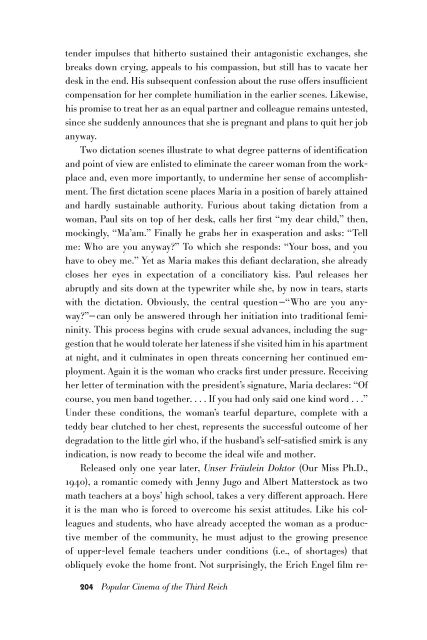Create successful ePaper yourself
Turn your PDF publications into a flip-book with our unique Google optimized e-Paper software.
tender impulses that hitherto sustained their antagonistic exchanges, she<br />
breaks down crying, appeals to his compassion, but still has to vacate her<br />
desk in the end. His subsequent confession about the ruse offers insufficient<br />
compensation for her complete humiliation in the earlier scenes. Likewise,<br />
his promise to treat her as an equal partner and colleague remains untested,<br />
since she suddenly announces that she is pregnant and plans to quit her job<br />
anyway.<br />
Two dictation scenes illustrate to what degree patterns of identification<br />
and point of view are enlisted to eliminate the career woman from the workplace<br />
and, even more importantly, to undermine her sense of accomplishment.<br />
The first dictation scene places Maria in a position of barely attained<br />
and hardly sustainable authority. Furious about taking dictation from a<br />
woman, Paul sits on top of her desk, calls her first “my dear child,” then,<br />
mockingly, “Ma’am.” Finally he grabs her in exasperation and asks: “Tell<br />
me: Who are you anyway?” To which she responds: “Your boss, and you<br />
have to obey me.” Yet as Maria makes this defiant declaration, she already<br />
closes her eyes in expectation of a conciliatory kiss. Paul releases her<br />
abruptly and sits down at the typewriter while she, by now in tears, starts<br />
with the dictation. Obviously, the central question—“Who are you anyway?”—can<br />
only be answered through her initiation into traditional femininity.<br />
This process begins with crude sexual advances, including the suggestion<br />
that he would tolerate her lateness if she visited him in his apartment<br />
at night, and it culminates in open threats concerning her continued employment.<br />
Again it is the woman who cracks first under pressure. Receiving<br />
her letter of termination with the president’s signature, Maria declares: “Of<br />
course, you men band together.... If you had only said one kind word . . .”<br />
Under these conditions, the woman’s tearful departure, complete with a<br />
teddy bear clutched to her chest, represents the successful outcome of her<br />
degradation to the little girl who, if the husband’s self-satisfied smirk is any<br />
indication, is now ready to become the ideal wife and mother.<br />
Released only one year later, Unser Fräulein Doktor (Our Miss Ph.D.,<br />
1940), a romantic comedy with Jenny Jugo and Albert Matterstock as two<br />
math teachers at a boys’ high school, takes a very different approach. Here<br />
it is the man who is forced to overcome his sexist attitudes. Like his colleagues<br />
and students, who have already accepted the woman as a productive<br />
member of the community, he must adjust to the growing presence<br />
of upper-level female teachers under conditions (i.e., of shortages) that<br />
obliquely evoke the home front. Not surprisingly, the Erich Engel film re-<br />
204 Popular Cinema of the Third Reich

















